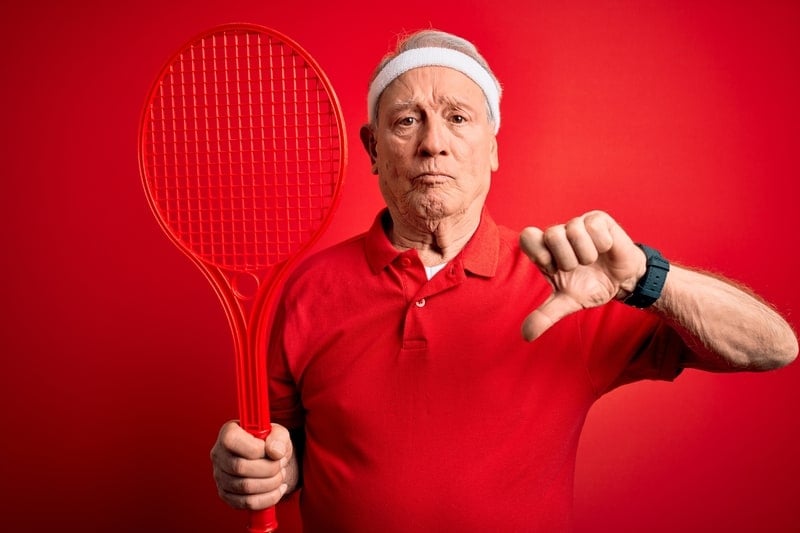7 Reasons Why Tennis Players Grunt

Listen hard enough in any sport, and there are a lot of weird sounds coming from players. Athletes moan and grunt all the time, but Tennis is the sport that gets a lot of notoriety for it. It’s very easy to hear during a point, and some players do quite a bit more than others.
With all these moans and grunts, there has to be a reason for it all, right? The answer is yes, tennis players do get something out of making all those noises. It might seem pretty weird to a casual observer, but there’s a reason why so many players rely on making sounds.
Some might roll their eyes at some of the justifications for groaning, but it happens quite a bit in tennis, regardless of sex or level. Here is a look at 7 reasons why tennis players moan and grunt on the court while playing.
1. It Keeps Player In Rhythm

During long rallies, rhythm is very important for tennis players. A player must do a lot of different things right to keep up with their opponent. It might not seem like that big of a deal, but moaning and grunting during the point help with that. It allows the player to remember when to exhale, and how to set up for a possible return shot.
When training for tennis, a player has a lot of different things to keep in mind during the process. Tennis is a lot about repetition, muscle memory, and more. Some players feel like they simply can’t play at a high level without moaning and grunting. They fall out of rhythm, don’t complete their shots, and just feel like a different player overall.
If a player is falling out of rhythm in the middle of the match, it usually means they are not doing everything they should. Maybe they’re getting a little tired with their preparation, or they are getting lazy. Groaning and moaning can help a person dial in once again.
That extra step is part of the process that gets them into a rhythm that they can appreciate. It’s something that every person should be looking for when they are playing the game.
2. It’s Natural

Long, extended grunting and moaning seem more like a specific tactic than anything, but making simple sounds is a lot more natural. Even players considered silent will make some small sounds when they hit the ball. Athletes shouldn’t feel ashamed of this, but embrace who they are.
If a player naturally makes a sound when they are hitting a ball hard and exhaling, they will be holding themselves back if they try to silence themselves. Some players are a little self-conscious of the noises, but no one should view that as a negative.
Players who justify the grunting show that they feel like it is a form of individual expression. Play should not be thinking they are different than other players. Players have so many other different things to worry about on the court, that they shouldn’t focus on trying to control something that they must constantly think about.
3. Better Breathing

Related to rhythm, proper breathing is essential for any player to have success in sports. Some players don’t breathe enough, and others don’t breathe at the right time. Some tennis trainers will teach exhaling during a shot to keep everything in order.
Once a player starts to understand the importance of exhaling at the right time, they might not even realize that they are making a loud sound when they hit the ball. It just becomes part of muscle memory, and it needs pointing out to them that they are making as loud of a sound as they are.
A lot of different athletes practice inhaling and exhaling at the proper times to maximize their performance. Weightlifters are a perfect example of this. Exhaling during the strenuous part of the lift (or stroke in tennis) maximizes performance.
Most tennis coaches are not going to mess with something like that if their players are having success. It might not be the most pleasant-sounding thing in the world, but it’s become the norm in tennis, so no one frowns on it like some would think.
4. It Adds Power

Some players adamantly believe that making a sound when hitting the tennis ball gives them additional power. As silly as that might sound to some people, there is some truth to that, albeit indirectly.
Players who notice added power are probably using their grunting and moaning as a timing mechanism that makes them focus on taking the ball at the right time and exhaling at the right time as well. Some players struggle with timing everything up, and this is one way to get it aligned properly.
Making sounds might make a player feel like they are hitting the ball harder, but that’s not the case. When moaning and grunting intensify during a match on television, it’s usually because a player is exerting themselves just a little bit more. They aren’t necessarily hitting the ball any harder than they would without making the noise, but this is the only technique they know how to use.
There are studies on whether or not grunting enhances hitting performance and power. On average, those players who consistently grunt as their default way of playing would hit the ball 3 to 5% harder than when they stay silent. Again, most of this connects to better breathing and rhythm, but if that’s what it takes for a player to take a harder, more consistent swing at the ball, it should continue.
Even players considered to be very quiet overall will occasionally grunt when they are hitting really hard shots. Listen closely enough, and Roger Federer will groan occasionally on serves, as well as overheads and outright winners off of the ground. When timed correctly, and a tennis player he makes close to perfect contact, the sound comes with the power.
5. It’s All They Know

Hang around tennis players long enough, and nearly all of them are superstitious to some degree. If they are used to playing a certain way and making sounds when they hit the ball, it’s nearly impossible to expect a change in their adult life. It would require complete reprogramming, and a few bad results would be instantly blamed on the change.
Most people believe a player should continue to play the way they know-how. Making drastic changes like this is only going to negatively affect a player. If moaning and grunting truly need to stop across tennis, it needs to start at a young age.
Instructors need to insist that their players stop getting in the habit early on in their life. A player under the age of 10 can change how they play, and not let it affect their professional career. Once a player is a top junior or professional, it’s too late.
Speaking of training players to stay quieter, many have accused the Nick Bollettieri Academy of making grunting such a popular method of hitting the ball. It is true that a lot of the notorious grunters on tour trained with him at one point in their life. Maybe it is a lack of stopping the habit when it is identified with young players or a calculated move to get a player a competitive advantage.
To their credit, they have started to make some effort to reduce grunting and moaning. It will still be a few years before people see whether it is working or not, but the academy doesn’t seem to like the label of playing such a huge role in making this a thing.
6. To Gain A Competitive Advantage

Those who are against people making sounds when they hit the ball say that it gives a player an unfair advantage. One of the reasons is not being able to hear the ball come off of the strings. A lot of players will judge how balls are hit based on the sound they hear of the strings, but grunting can completely drown that out.
The first pro player to point that out and argue against it was Martina Navratilova. She was getting very frustrated with players making sounds, she felt on purpose, to disguise shots just a little bit. Navratilova played the game and excelled at it by having the ability to properly get great jumps. She no longer felt confident that she was getting a good jump on the ball because she was not judging the ball the same way.
Extended moans and groans can also negatively affect an opponent as they try to prepare in their own way to hit the ball. A lot of players have complained about people holding their grunts for too long, and becoming a hindrance to the opposition. This call is usually left up to the umpire, and they can issue a warning or additional penalties if it seems like a blatant attempt to distract the opponent.
When a player is moaning and making sounds that extend beyond their normal strokes, that is trying to game the system as much as possible. The good news is that in today’s world, there are plenty of people who negatively react to a player showing gamesmanship like that.
If the umpire does not identify it right away, most fan bases will start to pick up on it fairly quickly. It won’t take long for a player to be put in their place when it comes to making too much noise at the wrong times.
7. Top Players Do It

In all sports, players emulate their heroes as much as possible. Andre Agassi and Monica Seles inspired a lot of the current generation to not be afraid to make noises when they hit the ball. Currently, players like Rafael Nadal, Maria Sharapova, and Serena Williams are influencing the next generation.
It might not seem like the best justification in the world, but it is a major reason why younger players will at least experiment with making moans and grunts when hitting the ball. Some players will ultimately feel like it is not helping them that much, while others might see an increase in their play and continue doing it.
Just like fashion styles, some things come and go in popularity. Maybe 20 years from now, grunting will seem like a thing of the past. For now, it very much is something fans hear a lot of, and those players influence the next generation.
The Argument Against Grunting

Grunting is more popular than ever, but that doesn’t mean that it is embraced by all. There are a lot of tennis plans, either casual or die-hard, that have a hard time watching certain players play because of how loud they are hitting the ball. Some players will register over 100 dB on their grunts, which is extremely loud for what is otherwise a quiet and elegant sport.
Players also have mixed feelings about grunting. Most players today have grown up with enough people around them who grant that it doesn’t really bother them. However, in the early days, a lot of players would complain about the worst grantors. They would say that they grunt for too long, or they tried to grunt too loudly during important points.
- Annoying for spectators
- Annoying for the competitor
Until tennis regulates moaning and grunting in some way, it’s not going to stop. It’s already gotten to the point that so many players do it, that it will be here to stay. Unless a player is trying to gain a competitive advantage by making sounds at different times, those who don’t like it will just need to accept it.
Final Feelings On Grunting
Not every player will benefit from grunting, but it happens in a lot of different sports. Weightlifting is perhaps the best example, as each repetition can be directly compared to each groundstroke in tennis. Proper breathing during these activities is important, and some just exhale louder than others.
If tennis wasn’t such a quiet game, all the sounds would not be that big of a deal. It’s only a huge deal in tennis because the microphones pick up all sounds during a point. If basketball, football, baseball, soccer, and other major sports played with a silent crowd and microphones very close to the action, groans would be heard throughout the game.






